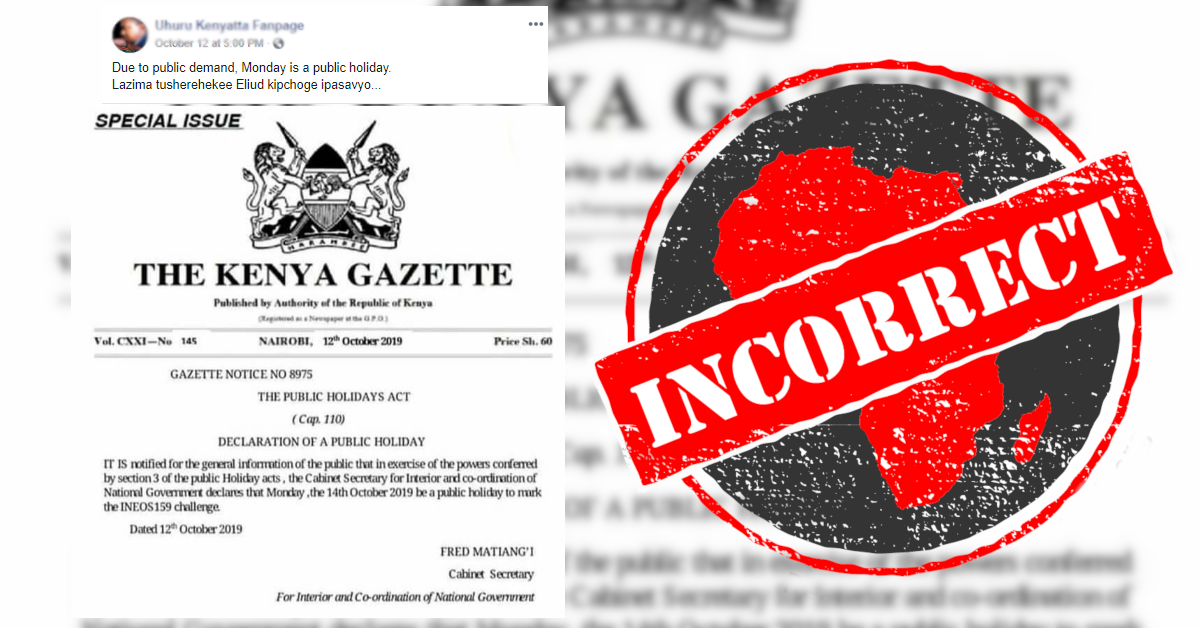On 12 October 2019 Kenyan athlete Eliud Kipchoge set a new record by being the first person to run a marathon in under two hours.
Hours later, a Facebook post claimed: “The government declares October 14 Kipchoge Day ...a public holiday!”
Another Facebook user posted what looked like a legal notice from the government’s Kenya Gazette, declaring 14 October 2019 a holiday.
It reads: “It is notified for the general information of the public that by the powers conferred by section 3 of the public Holidays acts, the Cabinet Secretary for Interior and Coordination of National Government declares that Monday, the 14th October 2019 be a public holiday to mark the INEOS159 challenge.”
The user commented: “Due to public demand, Monday is a public holiday. Lazima tusherehekee Eliud kipchoge ipasavyo.” That’s Kiswahili for: “We must celebrate Eliud Kipchoge accordingly.”
Has Kenya declared a national holiday to celebrate the legendary athlete? We checked.

On 13 October, Kenya’s interior ministry advised on its official Twitter account that there was no such holiday.
“Members of the public are urged to disregard any notice or report indicating that tomorrow is a public holiday. For avoidance of doubt the aforesaid Monday 14 October 2019 is a working day,” the tweet reads.
Attached is the “legal notice”, stamped “FAKE” in bold red.
This isn’t the first time Kipchoge’s achievement has been the subject of misinformation. There have been false reports that a Kenyan businessman promised the athlete a private jet. A manipulated version of the deputy president’s congratulatory tweet to Kipchoge also circulated online. – Grace Gichuhi
Hours later, a Facebook post claimed: “The government declares October 14 Kipchoge Day ...a public holiday!”
Another Facebook user posted what looked like a legal notice from the government’s Kenya Gazette, declaring 14 October 2019 a holiday.
It reads: “It is notified for the general information of the public that by the powers conferred by section 3 of the public Holidays acts, the Cabinet Secretary for Interior and Coordination of National Government declares that Monday, the 14th October 2019 be a public holiday to mark the INEOS159 challenge.”
The user commented: “Due to public demand, Monday is a public holiday. Lazima tusherehekee Eliud kipchoge ipasavyo.” That’s Kiswahili for: “We must celebrate Eliud Kipchoge accordingly.”
Has Kenya declared a national holiday to celebrate the legendary athlete? We checked.

‘It’s a working day’
On 13 October, Kenya’s interior ministry advised on its official Twitter account that there was no such holiday.
“Members of the public are urged to disregard any notice or report indicating that tomorrow is a public holiday. For avoidance of doubt the aforesaid Monday 14 October 2019 is a working day,” the tweet reads.
Attached is the “legal notice”, stamped “FAKE” in bold red.
This isn’t the first time Kipchoge’s achievement has been the subject of misinformation. There have been false reports that a Kenyan businessman promised the athlete a private jet. A manipulated version of the deputy president’s congratulatory tweet to Kipchoge also circulated online. – Grace Gichuhi
Republish our content for free
For publishers: what to do if your post is rated false
A fact-checker has rated your Facebook or Instagram post as “false”, “altered”, “partly false” or “missing context”. This could have serious consequences. What do you do?
Click on our guide for the steps you should follow.
Publishers guideAfrica Check teams up with Facebook
Africa Check is a partner in Meta's third-party fact-checking programme to help stop the spread of false information on social media.
The content we rate as “false” will be downgraded on Facebook and Instagram. This means fewer people will see it.
You can also help identify false information on Facebook. This guide explains how.


Add new comment